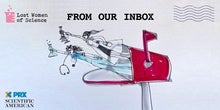 |
| December 19, 2023 |
New cell phones and other electronics are popular holiday gifts. But they also contain heavy metals like cobalt and copper, the demand for which is fueling humanitarian crises in the countries where they are mined. Holding off on purchasing the latest iPhone or choosing a refurbished device avoids the extraction of around 180 pounds of raw materials, according to recent reports. And if everyone in the U.S. kept their phone for an extra year on average, that would cut the manufacturing demand by more than 40 million pounds of raw materials per day. This week's top story has really helpful tips for buying used and refurbished electronics. Read more below. This newsletter will be taking a break next week for the holidays. See you in 2024! |
| |
 |
| |
| |
| |
| Defense This Filipina Physicist Helped Develop a Top Secret Weapon Emma Unson Rotor worked on the proximity fuze, a groundbreaking piece of World War II weapons technology that the U.S. War Department called "second only to the atomic bomb." | | By Erica Huang,The Lost Women of Science Initiative | | | |
| |
| |
| |
| |
FROM THE ARCHIVE
 | | | |
LATEST ISSUES
 |
| |
| Questions? Comments?  | |
| Download the Scientific American App |
| |
| |


















